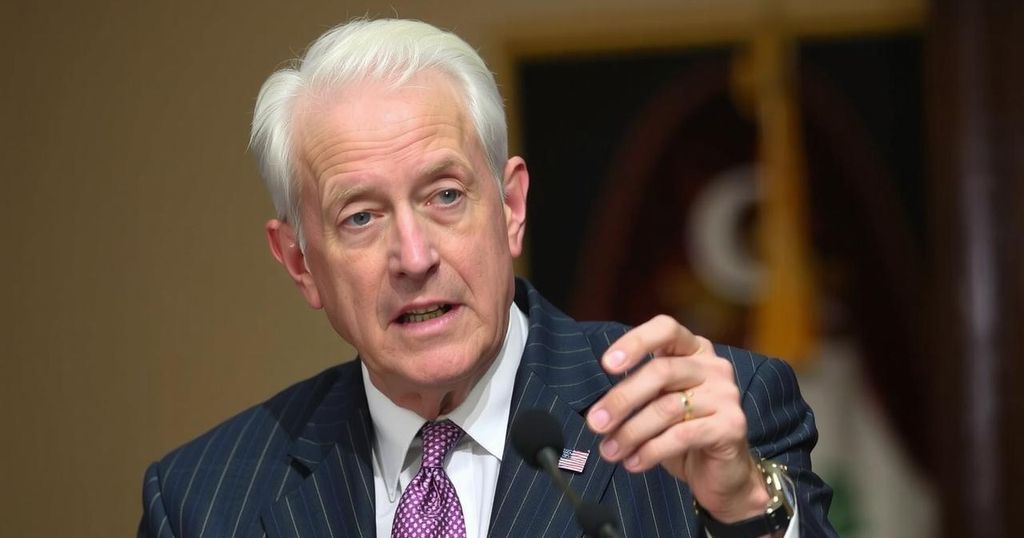President Biden labeled Assad’s fall in Syria a “fundamental act of justice,” warning of risks for the region. Discussions around U.S. military presence continue as the Syrian conflict intertwines with broader geopolitical complications involving Israel, Iran, and Russia. The situation remains precarious, with implications for civilian safety and regional stability.
On December 8, 2024, President Joe Biden remarked on the unexpected downfall of Bashar Assad in Syria, describing it as a “fundamental act of justice” after years of oppression; however, he cautioned that it presents a “moment of risk and uncertainty” for the Middle East. During a briefing at the White House, Biden noted that the U.S. was actively monitoring reports about Assad’s possible refuge in Moscow. He attributed the weakening of Assad’s support base—comprising Russia, Iran, and Hezbollah—to concerted actions taken by the U.S. and its allies, and indicated that the regional balance of power had shifted in favor of the opposition.
The sudden collapse of the Assad regime raises complex questions, compelling the Biden administration and the incoming Trump administration to reconsider the potential for escalating conflicts in the region. President-elect Donald Trump suggested that Assad had fled his country due to a lack of support from his ally President Vladimir Putin. However, he simultaneously expressed opposition to any military intervention by the U.S. to assist rebel forces in Syria.
Amidst the unrest, about 900 U.S. troops remain stationed in Syria, primarily collaborating with Kurdish forces in the northeast to forestall a resurgence of the Islamic State group. The situation is further complicated by ongoing tensions, including the conflict in Gaza and the fragile cease-fire with Hezbollah.
Trump highlighted a potential correlation between the upheaval in Syria and the conflict in Ukraine, claiming that Russia’s commitment to Assad has diminished in light of its engagements in Ukraine. However, Biden’s national security adviser emphasized the continuation of U.S. military presence in eastern Syria, asserting that it is strictly aimed at defeating ISIS rather than participating in the broader Syrian conflict.
As the opposition advances toward Damascus, they have begun releasing political prisoners, bringing renewed attention to the plight of missing individuals such as American journalist Austin Tice, whose family continues to advocate for his return. Tice disappeared in 2012 during the civil unrest, and his family remains hopeful for his safe return as the tumultuous political landscape unfolds.
The collapse of Assad’s administration may signal significant shifts within the region, and the Biden administration must navigate these complexities carefully while ensuring the protection of civilians and minority communities in Syria.
In conclusion, the fall of Assad reflects a major turning point in Syrian politics, representing both an aspiration for justice and the possibility of increased risks in the volatile landscape of the Middle East. The focus now lies on how the U.S. and its allies will respond to these changes, with ongoing implications for regional stability and international relations.
The article covers the recent political developments in Syria, particularly the downfall of President Bashar Assad, following years of civil conflict. It highlights President Biden’s remarks regarding the significance of these changes, as well as the cautious approach the U.S. is taking in response to the shifting dynamics of power in the region. The implications of this turmoil for the U.S. military presence in Syria and broader geopolitical relations are also explored, recognizing the complex interplay with other conflicts in the region, such as those involving Israel, Hamas, and Russia’s interests in Ukraine.
In summary, the unraveling of Assad’s regime signifies a potential turning point for justice in Syria, but also invokes apprehension regarding future conflicts in the Middle East. The Biden administration is challenged to navigate these complexities while maintaining a strategic position in the region. The developments may reshape alliances and require careful consideration of military commitments as the situation evolves.
Original Source: apnews.com






